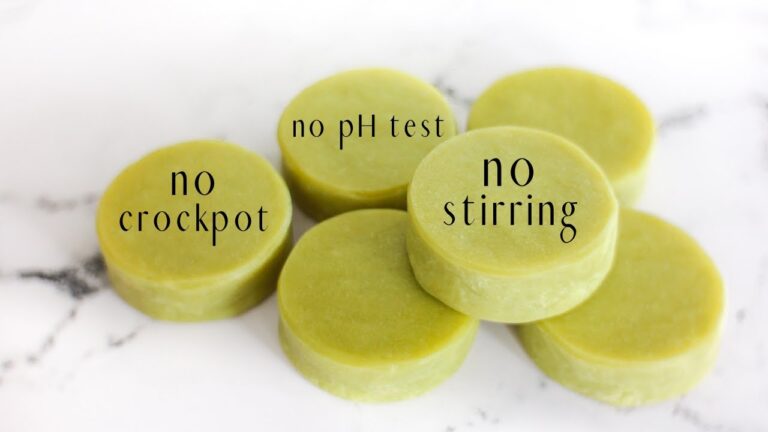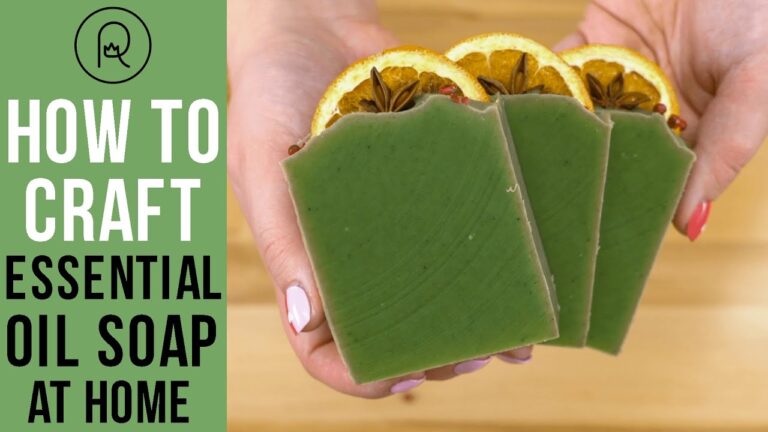Are you looking for a new and rewarding hobby? Hot process soap making may be just what you need. Not only is it a fun and creative activity, but it also comes with a multitude of benefits. From creating unique and personalized soap bars to knowing exactly what goes into your skincare products, hot process soap making is a rewarding and sustainable craft. In this article, we will explore the many advantages of hot process soap making and why it’s a great addition to your self-care routine.
What are the benefits of hot process soap?
Experience the benefits of hot process soap with shorter cure times, allowing you to enjoy your handmade soap creations sooner. Unlike cold process soap making, hot process soap bars are ready to use right away, making them a convenient and efficient option for those looking for immediate results.
What are the disadvantages of hot process soap?
Hot process soap is known for its thick texture, which can be a disadvantage when it comes to certain techniques such as layering and swirls. The heat used in the hot process method can cause the soap to harden quickly, making it challenging to achieve intricate designs and patterns in the soap.
While hot process soap offers the advantage of being ready to use sooner than cold process soap, its thick consistency can limit the creativity of soap makers. The rapid hardening of the soap can make it difficult to pour into molds smoothly and can result in uneven layers or swirls. This drawback may deter some soap makers from using the hot process method for more complex designs.
Overall, the disadvantage of hot process soap lies in its limited flexibility when it comes to intricate designs and patterns. While hot process soap may be a quicker option for soap making, the thick texture can pose challenges for those looking to create visually appealing and intricate soap designs. Despite this drawback, hot process soap remains a popular choice for many soap makers due to its shorter curing time and immediate usability.
How long does hot process soap last?
Hot process soap lasts longer than cold process soap. This is because the hot process method accelerates the saponification process, resulting in a harder and longer-lasting bar of soap. Additionally, the hot process soap has a shorter cure time, making it safe to use after just 24-48 hours of hardening. However, for the best results, it’s recommended to allow the hot process soap to cure for at least one week, which will further harden the soap and extend its lifespan.
The accelerated saponification process of hot process soap not only results in a harder bar, but also a longer-lasting one. This is due to the fact that the soap is fully hardened in a shorter amount of time, making it ready for use sooner than cold process soap. Allowing the hot process soap to cure for at least one week will further enhance its durability, ensuring that it will last longer and provide a longer-lasting lather during use. Therefore, if you’re looking for a soap that will stand the test of time, hot process soap is the way to go.
Efficient and Effective: The Benefits of Hot Process Soap Making
Hot process soap making is a time-saving and efficient method that yields high-quality results. By using heat to accelerate the saponification process, hot process soap making is faster than traditional cold process methods, allowing for a quicker turnaround time. This efficiency is especially beneficial for small-scale soap makers or those looking to produce soap in large quantities, as it can streamline production and reduce wait times for finished products.
In addition to being a time-saver, hot process soap making is also highly effective in creating a smooth and uniform final product. The application of heat helps to speed up the chemical reaction between oils and lye, resulting in a more thorough and complete saponification process. This not only ensures that all ingredients are fully incorporated, but also helps to eliminate any potential lye pockets or uneven distribution of additives, leading to a more consistent and high-quality bar of soap.
Overall, the benefits of hot process soap making are clear: it offers a time-efficient and effective way to produce high-quality soap. Whether you’re a small-scale artisan or a larger commercial producer, hot process soap making can streamline production and deliver consistent, top-notch results. With its ability to save time and create a uniform final product, hot process soap making is a valuable technique for anyone looking to create handmade soap with efficiency and effectiveness.
A Hot Topic: Exploring the Advantages of Hot Process Soap Making
Discover the many benefits of hot process soap making, a popular technique that offers a faster curing time and a more rustic appearance compared to traditional cold process methods. By heating the ingredients, the soap mixture is ready to use within hours, making it an ideal choice for those who prefer instant gratification. Additionally, the heat helps to accelerate the saponification process, resulting in a more thorough incorporation of essential oils and additives. Embrace the versatility and efficiency of hot process soap making, and elevate your soap crafting experience to new heights.
Elevate Your Soap Making: The Advantages of Hot Process Techniques
Elevate your soap making with the advantages of hot process techniques. By utilizing this method, you can create high-quality soaps that are ready to use much quicker than traditional cold process techniques. The hot process allows for a faster saponification process, resulting in a more efficient production timeline and a shorter curing period.
Not only does hot process soap making save you time, but it also gives you more control over the final product. The heat applied during the process helps to fully incorporate the ingredients, resulting in a smoother and more consistent texture. Elevate your soap making game by embracing the hot process technique and enjoy the benefits of efficiency and quality in every batch.
In summary, hot process soap making offers a range of benefits, including faster curing times, preservation of essential oils, and the ability to customize the soap’s texture and appearance. This method provides soap makers with more control and flexibility, resulting in high-quality, unique products that cater to individual preferences. With its efficient and versatile nature, hot process soap making is a valuable technique for both experienced artisans and beginners looking to explore the art of soap making.



